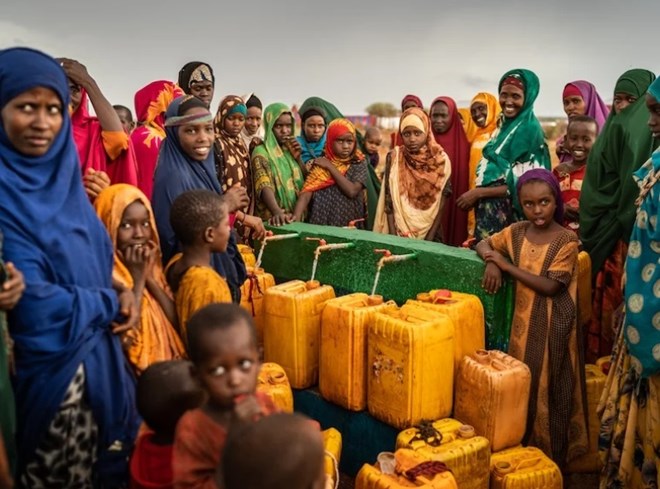Tuesday January 14, 2025
Somalia has long been portrayed as dysfunctional and unstable. Yet, beneath this oversimplified portrayal lies a nation of immense potential and strategic importance. Somalia is a maritime state with the longest coastline on the African continent. Throughout its tumultuous history, its shores have been a trade conduit connecting Africa, Asia, and Europe.
Overlooking the Bab al-Mandab Strait—a 28-kilometer-wide waterway separating Africa from Asia—Somalia sits at a global trade chokepoint through which 12% of the world’s commerce flows. The recent Houthi disruptions in shipping routes demonstrate the geostrategic value of this region. For a superpower like the United States, fostering stability in Somalia could transform it from a site of global concern into an ally of significant influence and opportunity.
Somalia’s value, however, is not solely tied to its location. It is endowed with resources whose economic potential is valued in trillions of U.S. dollars. These include an estimated 110 billion barrels of onshore oil and gas reserves alongside untapped marine resources that could sustain millions. Its vast coastline, spanning 3,300 kilometers, offers the promise of vibrant tourism industries, water sports, shipping hubs, and ports. With the right investments, Somalia’s coasts could host luxury hotels, bustling shipping centers, and economic activities rivaling global hotspots.
For the United States, Somalia’s energy potential is not just a lucrative business opportunity but a strategic asset. Somalia’s proximity to key shipping lanes in the Indian Ocean and the Red Sea adds to its appeal. Equipped with advanced technology and expertise, U.S. corporations could play a pivotal role in unlocking Somalia’s energy wealth. This partnership would generate mutual benefits: wealth for Somalia and strategic advantages for the United States.
Somalia’s maritime zone, encompassing an exclusive economic area of approximately 832,000 square kilometers, is among the richest in marine biodiversity. The waters teem with tuna, shrimp, lobsters, and other seafood. Yet, these resources remain largely unexploited due to cultural dietary habits and the scourge of illegal fishing by foreign vessels. This exploitation robs Somalia of significant economic gains and endangers its marine ecosystems.
American and Somali firms could sustainably develop this resource base with proper investment and collaboration. Beyond fishing, establishing fish processing industries and protecting maritime zones could create jobs for Somalis and Americans while curbing illegal activities by external actors. Maritime investments would transform Somalia’s waters into economic powerhouses, creating wealth and improving regional stability.
Somalia’s mineral wealth has been neglected and overshadowed by its agricultural economy. Yet the nation is rich in resources, including bauxite, gypsum, uranium, and other valuable minerals. Due to decades of political instability and a lack of investment, these assets remain largely unexploited. However, regulatory frameworks developed since 2012 provide an opportunity to unlock this potential while protecting the environment.
Agriculture, Somalia’s traditional economic backbone, remains another promising sector. Its fertile lands and diverse climate zones support the cultivation of crops such as sorghum, maize, millet, sesame, bananas, and mangoes. Livestock husbandry is another pillar, with millions of camels, cattle, goats, and sheep providing sustenance and income. In the past, Somalia was self-sufficient in sorghum and maize and even exported bananas to Europe and the Arabian Gulf.
Transitioning from subsistence to commercial agriculture would enable Somalia to reduce food imports, meet domestic demand, and establish itself as a food exporter. Neighboring regions like the Arabian Peninsula, which rely heavily on imported food, could become key markets for Somali produce. With American agricultural expertise, Somalia could modernize its farming techniques, increase productivity, and boost its economy.
Why should Somalia warrant American attention and investment? Beyond its vast natural resources, Somalia occupies a critical geographic position for projecting influence in the Indian Ocean and the Arabian Peninsula. Throughout history, great powers have recognized the importance of securing alliances with nations like Somalia to safeguard trade routes and project global power.
The United States has already demonstrated its commitment to Somalia. In 1993, President George H.W. Bush launched Operation Restore Hope to alleviate suffering caused by drought and famine. This effort underscored the potential for positive U.S.–Somalia relations, even amidst challenges. Today, Somalia’s fragile political environment demands renewed engagement to address corruption, rebuild institutions, and create economic opportunities.
Somalia’s current dysfunction is not inevitable. Through targeted investments and strategic partnerships, the United States could help rebuild Somalia into a stable and prosperous nation. Replacing corrupt leadership with technocratic governance, supported by U.S. expertise, would restore public trust and institutional efficiency. By fostering a thriving Somali economy, the United States would gain a valuable ally and a bulwark against the influence of rival powers like China and the BRICS bloc.
The potential for a U.S.–Somalia partnership is immense. Somalia’s resources, geography, and untapped potential make it a key player in the Horn of Africa. For the United States, this is not merely an opportunity to assist a struggling nation but a chance to secure its own strategic interests in an increasingly competitive world. Together, Somalia and the United States could rewrite the narrative, transforming a nation of challenges into a land of promise and partnership.
Sheiknor Qassim is a Somali political activist and a prominent figure in the South West political landscape.